Have you ever wished for a natural, affordable solution to healthier, shinier hair? Well, look no further—rosemary water might just be the miracle you’ve been searching for! This simple yet powerful remedy has taken the beauty world by storm, offering benefits that range from boosting hair growth to soothing an itchy scalp. But how does it work, and is it really as effective as everyone claims? Let’s dive into the details and uncover the magic of rosemary water for hair.
Table of Contents
1. What Is Rosemary Water?
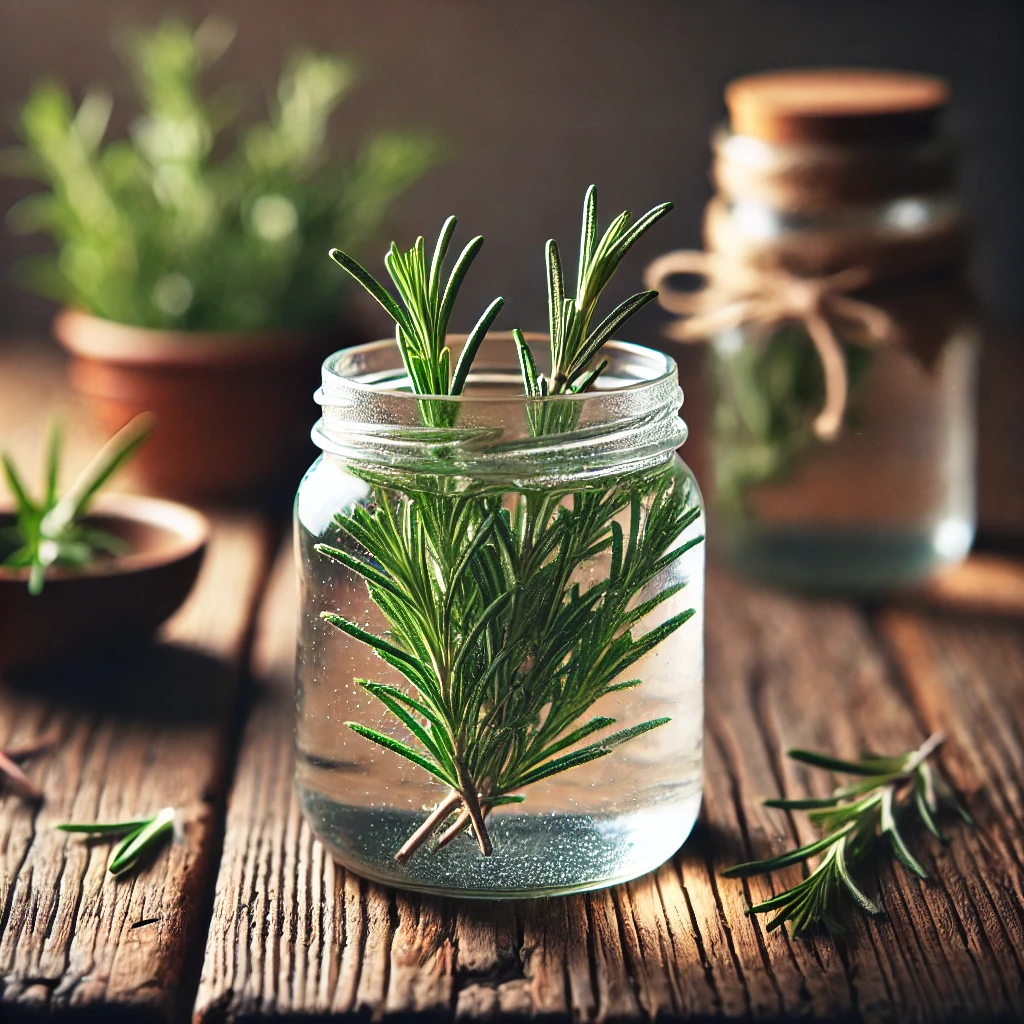
Rosemary water is a natural hair treatment made by steeping the leaves of the rosemary plant in water. This plant, known scientifically as Rosmarinus officinalis, is a fragrant herb commonly found in Mediterranean cuisine and traditional medicine. For centuries, rosemary has been celebrated for its numerous health benefits, including its ability to enhance memory, improve circulation, and promote overall well-being. But beyond its culinary and medicinal uses, rosemary has gained attention in the beauty world for its transformative effects on hair.
At its core, rosemary water is a simple infusion that captures the essence of this powerful herb. The process of creating rosemary water allows its beneficial compounds—such as antioxidants, essential oils, and vitamins—to infuse into the water, making it a potent yet gentle solution for hair care. Whether you’re dealing with thinning hair, dandruff, or just looking to add some shine to your locks, rosemary water is a versatile, all-natural remedy worth exploring.
2. Benefits of Rosemary Water for Hair

Rosemary water has a host of benefits for your hair and scalp, making it a must-try solution for those seeking a natural approach to hair care. Here’s a breakdown of its most notable advantages:
Promotes Hair Growth
One of the most celebrated benefits of rosemary water is its ability to stimulate hair growth. By improving blood circulation to the scalp, it ensures that hair follicles receive the nutrients and oxygen they need to thrive. Studies suggest that rosemary water can even rival popular chemical treatments like minoxidil when it comes to encouraging hair regrowth.
Fights Dandruff
Dealing with dandruff can be frustrating, but rosemary water offers a natural solution. Its antifungal and antimicrobial properties target the root causes of dandruff, such as yeast and bacterial overgrowth, while soothing inflammation and reducing itchiness. Regular use can help maintain a healthy, flake-free scalp.
Reduces Hair Loss
Hair loss can occur for various reasons, from stress to hormonal imbalances. Rosemary water strengthens the hair follicles, reducing breakage and hair fall over time. Its ability to block DHT, a hormone linked to hair loss, makes it especially effective for those experiencing thinning hair or early signs of balding.
Enhances Shine and Texture
If your hair feels dull or lifeless, rosemary water can help revive it. The infusion nourishes the strands, restoring their natural shine and softness. Regular use can also improve hair texture, making it smoother and more manageable.
Balances Scalp Oil Production
Whether you have an oily or dry scalp, rosemary water helps regulate sebum production. This balance prevents the scalp from becoming too greasy or too dry, creating an optimal environment for healthy hair growth.
Protects Against Environmental Damage
Exposure to pollution, UV rays, and harsh chemicals can take a toll on your hair. The antioxidants in rosemary water act as a shield, protecting your hair from environmental damage and free radicals that can cause premature aging and brittleness.
In short, rosemary water is a multi-functional, all-natural elixir that addresses a variety of hair concerns, making it a valuable addition to any hair care routine. Whether you’re looking to grow longer locks, combat dandruff, or simply enjoy healthier hair, rosemary water has something to offer everyone.
3. How Rosemary Water Works

To understand why rosemary water is so effective for hair care, let’s dive into how it works. This natural remedy isn’t just about hydration—it’s packed with powerful compounds that interact with your scalp and hair in remarkable ways.
Boosts Blood Circulation
Rosemary water enhances blood flow to the scalp, ensuring that hair follicles receive the nutrients and oxygen they need to produce healthy hair. Improved circulation also helps prevent follicle shrinkage, a common cause of hair thinning.
Rich in Antioxidants
The herb is brimming with antioxidants, such as rosmarinic acid, caffeic acid, and carnosic acid, which protect hair cells from damage caused by free radicals. These antioxidants also promote a healthier scalp, which is essential for strong, vibrant hair.
Anti-Inflammatory Properties
Scalp inflammation can disrupt hair growth and contribute to issues like dandruff and hair loss. Rosemary water’s anti-inflammatory properties calm irritation and create an environment where hair can grow without obstacles.
Inhibits DHT
DHT (dihydrotestosterone) is a hormone linked to hair thinning and balding, particularly in men. Rosemary water has been found to block DHT production, preventing this hormone from damaging hair follicles.
Balances Scalp Microbiome
A healthy scalp microbiome is crucial for maintaining strong, resilient hair. Rosemary water helps balance the microbiome by reducing harmful bacteria and fungi while promoting the growth of beneficial microorganisms.
4. Rosemary Water vs. Other Hair Treatments

With so many hair care products and treatments available, you might wonder how rosemary water compares. Here’s why it stands out:
Natural and Chemical-Free
Unlike many commercial products loaded with synthetic ingredients, rosemary water is completely natural. This makes it a great choice for those with sensitive skin or who prefer to avoid chemicals in their beauty routine.
Affordable and Accessible
High-end hair treatments can be expensive and require frequent salon visits. Rosemary water, on the other hand, is cost-effective and easy to make at home using just a few simple ingredients.
No Harsh Side Effects
Chemical treatments like minoxidil or keratin can sometimes cause side effects like scalp irritation or dryness. Rosemary water offers similar benefits without these drawbacks, making it a safer option for long-term use.
Complementary to Other Treatments
You don’t have to give up your current hair care products to use rosemary water. It works well alongside other treatments, enhancing their effectiveness and providing additional benefits.
5. How to Make Rosemary Water at Home
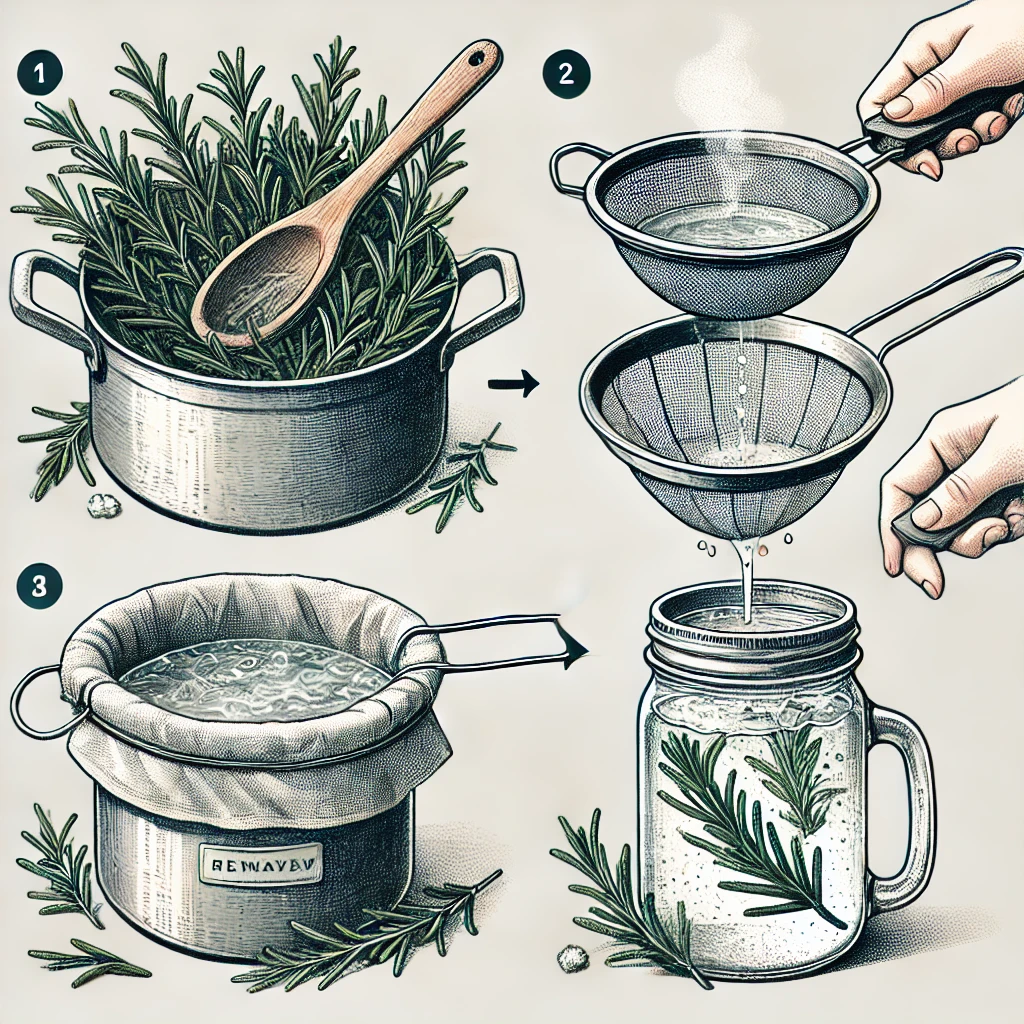
One of the best things about rosemary water is how easy it is to make. Here’s a simple step-by-step guide:
Ingredients:
- 2 cups of water
- A handful of fresh rosemary sprigs (or 2 tablespoons of dried rosemary)
- Optional: a few drops of essential oils like lavender or tea tree for added benefits
Instructions:
- Boil the Water: Start by bringing the water to a boil in a saucepan.
- Add Rosemary: Toss in the rosemary leaves or sprigs and reduce the heat to a simmer.
- Steep: Let the rosemary steep for 10–15 minutes. The longer it steeps, the more potent the infusion will be.
- Cool and Strain: Remove the saucepan from heat, let the water cool, and strain out the rosemary leaves.
- Store: Pour the infused water into a spray bottle or jar for easy application. Store it in the refrigerator for up to a week.
Making your own rosemary water ensures freshness and allows you to customize it with additional ingredients to suit your hair’s needs.
6. How to Use Rosemary Water on Hair
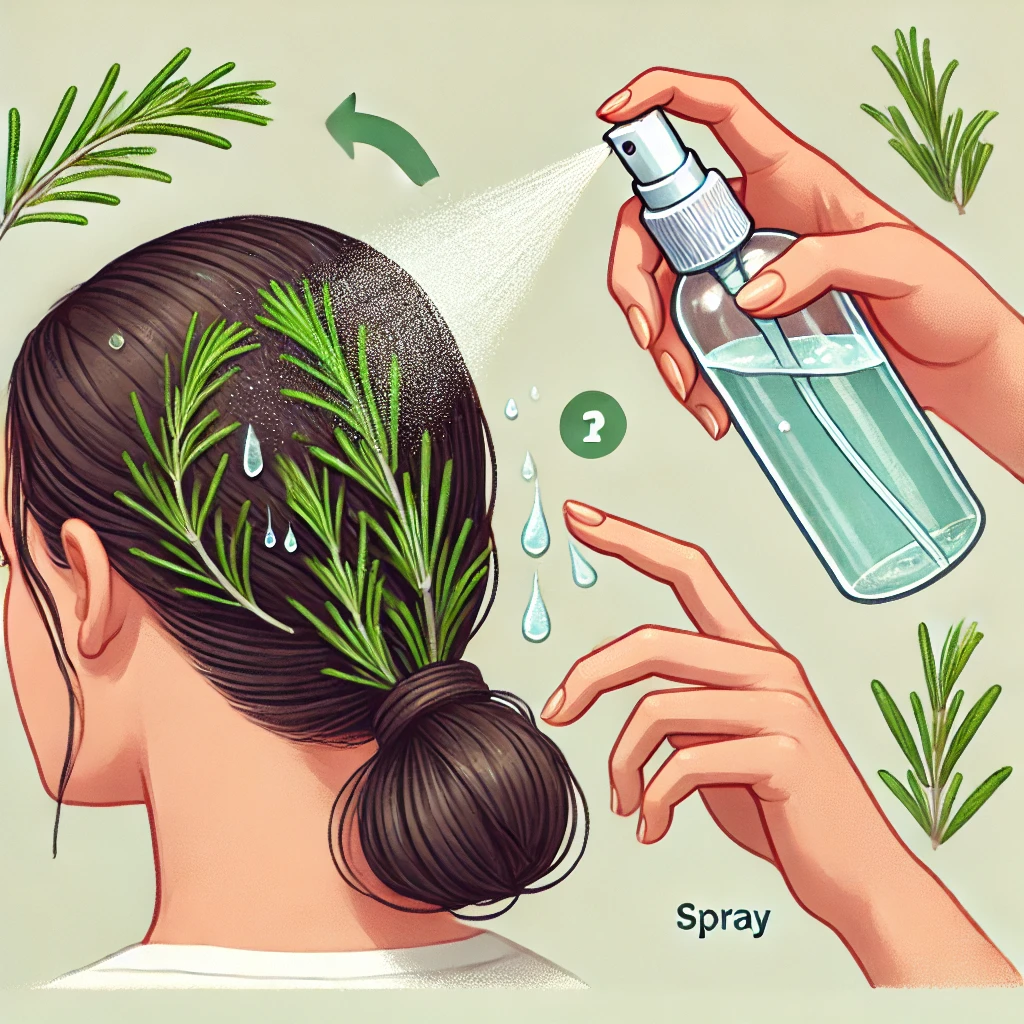
There are several ways to incorporate rosemary water into your hair care routine:
As a Rinse
After shampooing and conditioning, pour rosemary water over your hair as a final rinse. This helps seal in moisture and adds shine.
As a Leave-In Spray
Transfer the rosemary water into a spray bottle and spritz it onto your scalp and hair daily. This method is especially effective for targeting hair growth and scalp health.
Scalp Massage
Combine rosemary water with a carrier oil like coconut or jojoba oil and use it as part of a soothing scalp massage. This promotes relaxation and further stimulates hair follicles.
In Hair Masks
Mix rosemary water into your favorite hair mask recipe for an extra boost of nutrients and hydration.
By using rosemary water regularly, you can achieve noticeable improvements in hair health without investing in expensive products or treatments. Whether you’re battling hair loss or simply want to maintain a healthy scalp, this natural remedy has you covered.
7. Who Can Benefit from Rosemary Water?

Rosemary water isn’t just for people with specific hair concerns—it’s a versatile remedy that benefits a wide range of hair types and issues. Let’s explore who stands to gain the most:
Those Struggling with Hair Loss
If you’re experiencing thinning hair or excessive hair shedding, rosemary water can be a game-changer. Its ability to block DHT and stimulate dormant hair follicles makes it ideal for those looking to combat hair loss naturally.
People with Dandruff or Scalp Irritation
A flaky, itchy scalp can be a major source of discomfort. Rosemary water’s antifungal and anti-inflammatory properties soothe irritation and help restore balance, making it a great option for tackling dandruff and scalp conditions like seborrheic dermatitis.
Anyone Seeking Stronger, Shinier Hair
Even if you don’t have major hair concerns, rosemary water can enhance your hair’s overall health and appearance. It strengthens strands, reduces breakage, and adds a noticeable shine that makes your hair look and feel its best.
Suitable for All Hair Types
Whether you have fine, thick, straight, curly, or coily hair, rosemary water can adapt to your needs. It’s lightweight enough not to weigh down fine hair and nourishing enough to hydrate thicker textures.
8. Rosemary Water for Hair Growth

When it comes to hair growth, patience is key—but rosemary water can help speed up the process. Here’s how:
Stimulates Hair Follicles
Hair growth begins at the roots, and rosemary water ensures that your follicles have everything they need to flourish. By increasing blood circulation to the scalp, it delivers essential nutrients and oxygen directly to the hair follicles.
Revitalizes Dormant Follicles
Hair growth slows down when follicles enter a resting phase. Rosemary water “wakes up” these dormant follicles, encouraging them to produce new hair.
Improves Scalp Health
A healthy scalp is the foundation of strong hair growth. Rosemary water fights off scalp infections, reduces inflammation, and maintains a balanced pH level, creating the ideal environment for hair to thrive.
Blocks DHT (Dihydrotestosterone)
DHT is a hormone that can shrink hair follicles and lead to hair thinning. Rosemary water’s ability to inhibit DHT production makes it an excellent choice for those struggling with androgenetic alopecia (pattern hair loss).
Using rosemary water consistently can result in thicker, healthier hair over time. While it won’t produce instant results, many users report noticeable improvements within a few months of regular use.
9. Tackling Dandruff and Scalp Issues
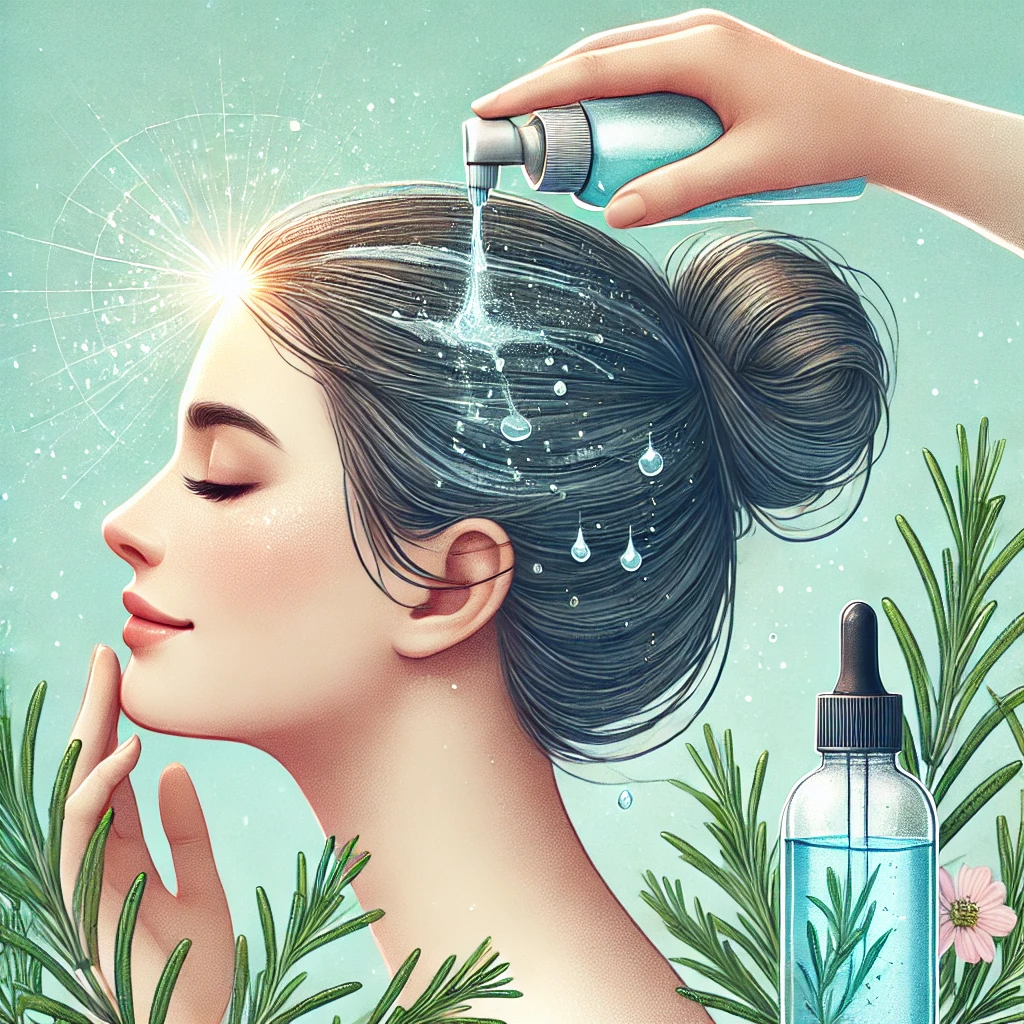
Dandruff can be caused by several factors, including dry skin, fungal infections, or an imbalance in scalp oils. Fortunately, rosemary water addresses these issues in multiple ways:
Fights Fungal Infections
The antifungal properties of rosemary water target common causes of dandruff, such as Malassezia yeast. By reducing fungal overgrowth, it helps eliminate flakes and irritation.
Soothes Itchy Scalps
If your scalp feels itchy and inflamed, rosemary water can provide instant relief. Its anti-inflammatory compounds calm irritation, leaving your scalp feeling refreshed and comfortable.
Balances Sebum Production
An overproduction of scalp oils can lead to greasy hair and dandruff, while underproduction can cause dryness. Rosemary water regulates sebum production, keeping your scalp hydrated without being overly oily.
Detoxifies the Scalp
Rosemary water acts as a gentle detox for your scalp, removing buildup from hair products, oils, and pollutants. A clean, healthy scalp is less likely to experience dandruff or other issues.
10. DIY Recipes for Rosemary Water

Ready to take your rosemary water game to the next level? Here are some creative variations you can try:
Rosemary and Mint Infusion
Mint adds a cooling sensation to this recipe, making it perfect for soothing an irritated scalp.
- Ingredients: Fresh rosemary sprigs, fresh mint leaves, 2 cups of water
- Method: Boil the water, add both herbs, steep for 15 minutes, strain, and cool.
Rosemary and Apple Cider Vinegar Rinse
This combination helps detoxify the scalp and restore its natural pH balance.
- Ingredients: 1 cup rosemary water, 1 tablespoon apple cider vinegar
- Method: Mix the ingredients and use as a post-shampoo rinse.
Rosemary and Lavender Spray
Lavender essential oil adds a calming aroma and additional scalp benefits.
- Ingredients: 1 cup rosemary water, 5 drops lavender essential oil
- Method: Combine in a spray bottle and shake well before use.
Rosemary and Green Tea Rinse
Green tea’s antioxidants complement rosemary’s benefits, providing an extra boost for your hair.
- Ingredients: 1 cup brewed green tea, 1 cup rosemary water
- Method: Mix and apply as a rinse after washing your hair.
11. Potential Side Effects and Precautions
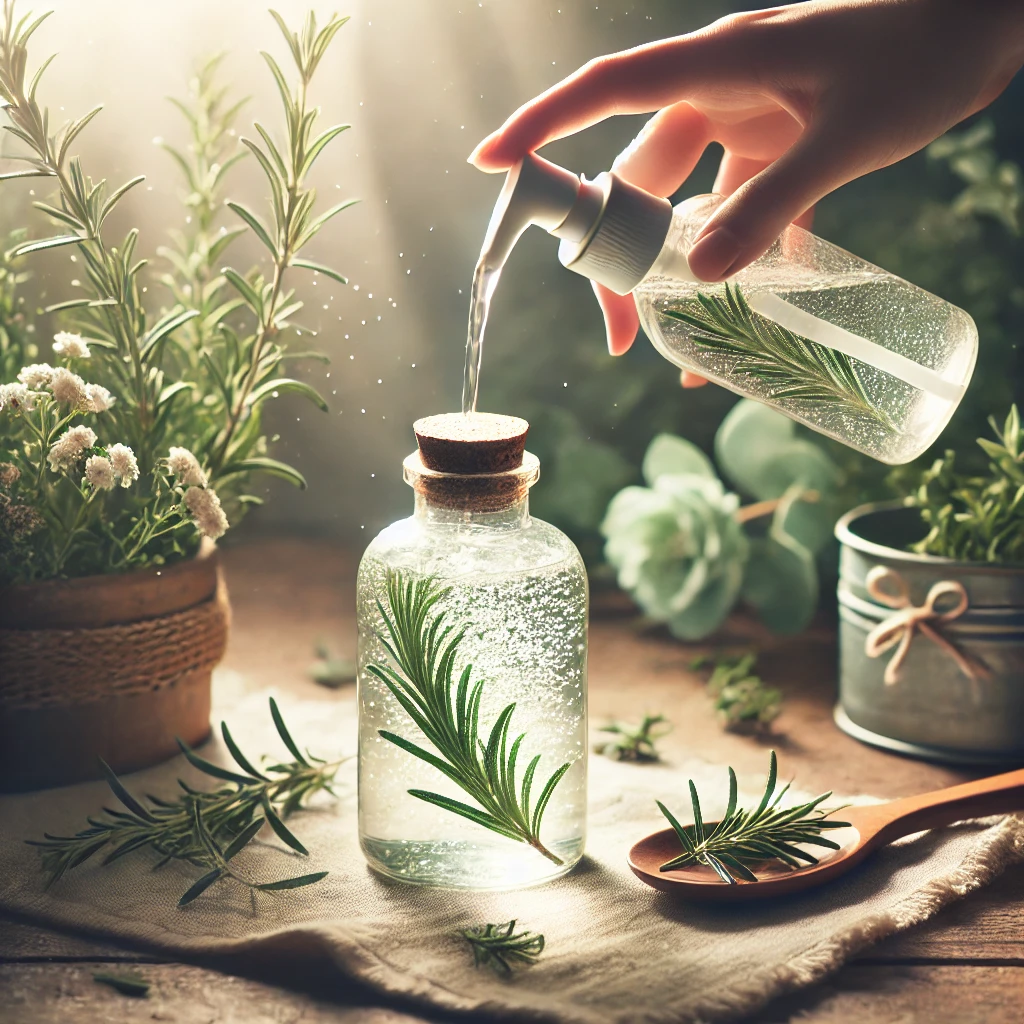
While rosemary water is generally safe for most people, there are a few precautions to keep in mind:
Scalp Sensitivity
Some people with sensitive skin may experience mild irritation or redness. Always do a patch test before applying rosemary water to your entire scalp.
Allergic Reactions
Although rare, allergic reactions to rosemary can occur. Discontinue use if you notice itching, swelling, or other signs of an allergic reaction.
Pregnancy and Medical Conditions
Pregnant or breastfeeding individuals should consult a healthcare provider before using rosemary water. Additionally, those with medical conditions like epilepsy should avoid high concentrations of rosemary, as it may act as a stimulant.
Proper Storage
Homemade rosemary water should be stored in the refrigerator and used within a week to prevent bacterial growth.
By keeping these precautions in mind, you can enjoy all the benefits of rosemary water without any worries.
12. How Often Should You Use Rosemary Water?

Consistency is key when using rosemary water to improve your hair’s health. While it’s tempting to use it every day, moderation is essential to prevent overuse or scalp irritation. Here’s a guide to how often you should apply rosemary water based on your hair goals:
For Hair Growth
Use rosemary water 2–3 times per week for optimal results. This frequency allows your scalp to absorb the nutrients and stimulates hair follicles without overwhelming the skin.
For Dandruff Control
If you’re using rosemary water to combat dandruff, apply it 3–4 times a week as part of your scalp care routine. You can use it as a rinse, leave-in treatment, or part of a scalp massage.
For Maintenance and Shine
If your goal is simply to maintain healthy, shiny hair, using rosemary water once a week as a rinse or spray is sufficient.
Overnight Use
For an intensive treatment, you can leave rosemary water in your hair overnight 1–2 times a week. Just spray it onto your scalp, massage it in, and cover your hair with a silk or satin scarf to prevent drying out.
Monitor Your Scalp
While rosemary water is gentle, everyone’s skin reacts differently. Pay attention to how your scalp feels and adjust your usage accordingly. If you notice any irritation or dryness, reduce the frequency.
13. Real-Life Success Stories

The beauty of rosemary water lies in its simplicity, but its results are anything but ordinary. Many people have shared inspiring success stories about how this natural remedy transformed their hair:
Thicker, Fuller Hair
“I’ve struggled with thinning hair for years and tried everything under the sun. After using rosemary water consistently for three months, I started noticing new baby hairs along my hairline. My hair feels thicker and healthier now.” – Emma, 34
Dandruff-Free Scalp
“I used to deal with constant itching and flaking. After incorporating rosemary water into my routine twice a week, my dandruff disappeared within a month. My scalp feels clean and refreshed.” – Raj, 28
Improved Hair Texture
“My curly hair always felt dry and unmanageable. Rosemary water has been a game-changer—it’s softer, shinier, and easier to style. Plus, it smells amazing!” – Lila, 25
Reduced Hair Shedding
“Postpartum hair loss hit me hard. I started using rosemary water as a leave-in spray, and within a few weeks, the shedding slowed down significantly. I’m finally seeing regrowth!” – Sarah, 30
These real-life results highlight how effective rosemary water can be for various hair concerns.
14. Tips to Maximize Results
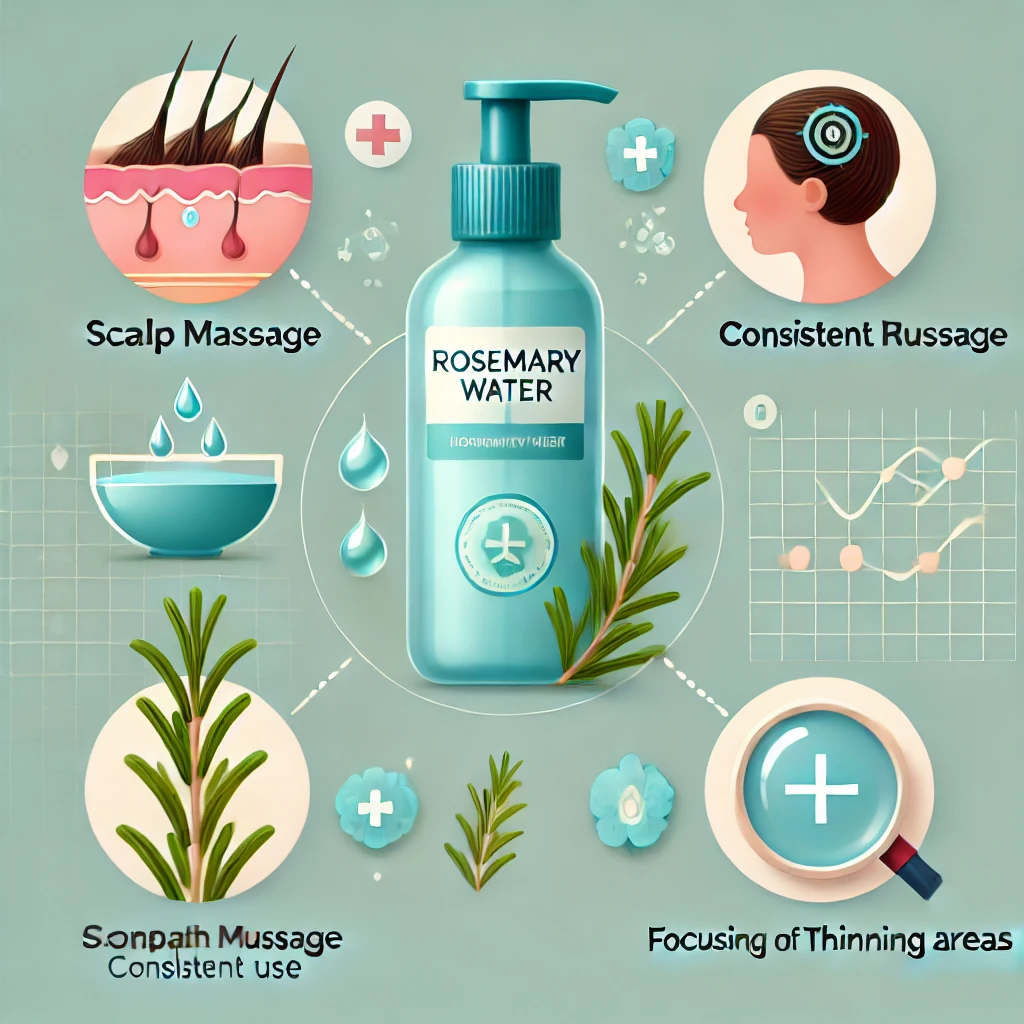
To get the most out of your rosemary water routine, keep these tips in mind:
Use Fresh Ingredients
Whenever possible, opt for fresh rosemary sprigs over dried ones. Fresh rosemary contains higher levels of essential oils and nutrients.
Combine with Other Remedies
Pair rosemary water with other natural hair care treatments, like aloe vera gel, coconut oil, or argan oil, to enhance its effects.
Massage Your Scalp
Scalp massages increase circulation and help rosemary water penetrate more deeply. Spend a few minutes massaging your scalp whenever you apply it.
Be Patient and Consistent
Natural remedies take time to show results. Stick to your rosemary water routine for at least 3–6 months to see noticeable changes.
Protect Your Hair
While rosemary water can strengthen your hair, protecting it from heat damage and over-styling is equally important for long-term health.
15. FAQs About Rosemary Water
1. Can rosemary water really regrow hair?
Yes! Rosemary water improves scalp circulation, reactivates dormant hair follicles, and blocks DHT, which contributes to hair loss. While results vary, many users report significant regrowth over time.
2. How long does it take to see results?
Most people start noticing improvements within 4–6 weeks of regular use, but it may take 3–6 months for significant changes like reduced hair fall and visible new growth.
3. Can I leave rosemary water in my hair overnight?
Yes, leaving it in overnight can provide a deep conditioning effect and maximize its benefits. Just make sure to rinse it out in the morning.
4. Is rosemary water safe for chemically treated hair?
Absolutely! Rosemary water is gentle and works well on dyed, permed, or chemically treated hair. It can even help mitigate damage caused by harsh treatments.
5. Does rosemary water expire?
Homemade rosemary water lasts about a week if stored in the refrigerator. Adding a natural preservative like vitamin E oil can extend its shelf life slightly.
Conclusion
Rosemary water for hair is a simple yet powerful remedy that combines affordability, effectiveness, and natural goodness. Whether you’re looking to grow thicker hair, tackle dandruff, or simply enhance your hair’s health and shine, this age-old herbal solution is worth a try. With consistent use and a bit of patience, you’ll be well on your way to achieving luscious, healthy locks. Why not start your rosemary water journey today and unlock the full potential of your hair?






